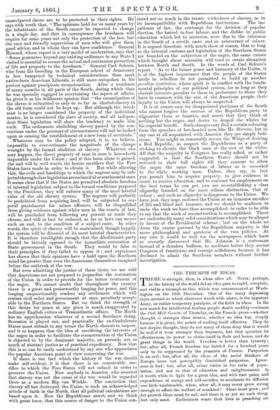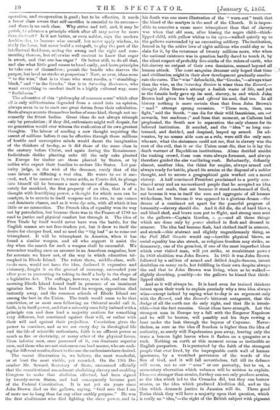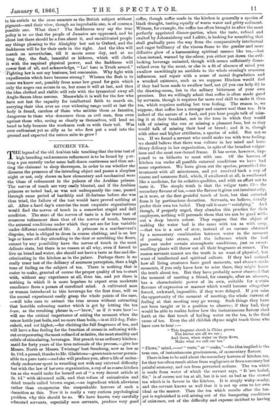THE TRIUMPH OF IDEAS.
THERE is strength, then, in ideas after all. Never, perhaps, in the history of the world did an idea gain so rapid, complete, and visible a triumph as that which was consummated at Wash- ington on the 19th December. One of the many depressing signs around us which observers watch with alarm, is the apparent decay, or rather temporary paralysis, of the faith in ideas. In the new search for intellectual realism people doubt audibly—witness the Pall Mall Gazette of Thursday, on the French press—whether thought is stronger than armies, whether an idea has, simply because it is great, the power of making itself effective. They do not despise thought, they do not many of them deny that it would be well if it were stronger than bayonets, but they question its effectiveness, its power to clothe itself in flesh and bones, and do great things in the world. Freedom is better than tyranny ; but, after all, French freedom has battled for a hundred years only to be suppressed by the peasants of France. Pauperism is an evil ; but, after all, the ideas of the social thinkers of Europe have not perceptibly diminished pauperism. Ignor- ance is bad ; but, after all, crime varies in the ratio of popu- lation, and not in that of education and enlightenment. Is it worth while to fight for a great idea, and with vast pains and expenditure of energy and self-sacrifice to accelerate its diffusion one little hairbreadth, when, after all, it may never grow strong enough to affect the welfare of mankind? Ideas must grow, and for growth there must be soil, and there is as yet no such thing, but only sand. Enthusiasts waste their lives in preaching co-
operation, and co-operation is good ; but to be effective, it needs a lower class aware that self-sacrifice is essential to its success— and there is no such class. Why strive and toil, and, it may be perish, to advance a principle which after all may never be more than abstract? Is it not better, or even nobler, says the modern Archim !des, to become wise oneself, but never apply wisdom, to !Andy the lever, but never build a catapult, to play the part of the
intellectual Sadducee, seeing the wrong and the right and com- menting thereon, but otherwise well content to know that sugar
is sweet, and that one has sugar ? Or better still, to do all that, and also what little good comes to hand easily, and leave principles to take care of themselves ; punish the beadle who starves the pauper, but level no stroke at pauperism ? Now, as ever, ideas seem " to the wise," that is to those who want results, a " stumbling- block," and " to the Greeks," that is to Saturday Reviewers, who want everything to conduct itself in a highly cultured way, mere " foolishness."
The advocates of this "philosophy of common sense" which after all is only utilitarianism degraded from a creed into an opinion, always seem to us to omit one great datum from their calculation. Souls always accrete themselves bodies of some kind, though not ne- cessarily the fittest bodies. Great ideas do not always triumph only by percolation ; if they did, enthusiasts might well despair, for no generation would ever witness the realization of its own greatest thoughts. The labour of sending a new thought requiring the assent of millions before it can be effective through those millions of hostile and unreceptive minds would daunt the imagination of the thinkers of today, as it did those of the same class in the century before Christ, and again during the Renaissance. Individuals dislike planting oaks till the only oaks planted in Europe for timber are those planted by States, or by nobles who expect their families to endure like States. Let pos- terity judge, is the wish of the dreamer, rarely that of the man intent on diffusing a real idea. He wants to see it suc- ceed, and, if he cannot see it, turns aside, as Comte did, to plunge into himself till he becomes a mere dreamer of dreams. Fortu- nately for mankind, the first property of an idea, that is of a thought with fructifying power, a thought for which men can be martyrs, is to accrete to itself weapons not its own, to use causes and dominate classes, and as it were dye acts, with all which it has little or no connection. The French idea of equality won its way not by percolation, but because there was in the France of 1789 no road to justice and physical comfort but through it. The idea of Free Trade by itself would never have won the battle, for the English masses are not free-traders yet, but it drew to itself the desire for cheaper food, and so used the " big loaf " as to come out triumphant. It will be triumphant in America, when it has found a similar weapon, and all who support it assist the day when the search for such a weapon shall be successful. We remember reading once an account in an American magazine, how far accurate we know not, of the way in which education tri- umphed in Rhode Island. The rulers there, middle-class, well- to-do men, would not have the idea, declared it expensive and visionary, fought it on the ground of economy, succeeded year after year in preventing its taking to itself a body in the shape of a legislative Act. The suffrage, however, was wide, and one fine morning Rhode Island found itself in presence of an imminent agrarian law. The idea had found its weapon, opposition died instantly away, and the common schools of Rhode Island are among the best in the Union. The truth would seem to be that conviction, or as most men following an Oriental model call it, faith, is in itself power, and that a minority once fully imbued with a principle can and does lead a majority anxious for something very different, but convinced against their will, or rather with their will and against their prejudices. Conviction gives the power to convince, and as we see every day in theological life and the life of scientific enthusiasts, faith is an effluent power as much as fire or electricity, or many other of the physical forces. Even inferior men, once possessed of it, can dominate superior men, and those who are not statesmen can lead masses, who are seek- ing far different results, direct to the one the enthusiasts have desired.
The recent illustration is, we believe, the most wonderful, or at least the most visible, yet recorded. On the 19th De- cember Mr. Seward, Secretary of State, announced officially that the constitutional amendment abolishing slavery and enabling Congress to make that abolition effectual, had been signed by twenty-seven States, and had consequently become part of the Federal Constitution. It is not yet six years since John Brown died on the gallows, saying, " God sees that I am of more use to hang than for any other earthly purpose." He was the first abolitionist who died fighting the slave power, and in
his death was one more illustration of the " worn-out" truth that the blood of the martyrs is the seed of the Church. It is impos- sible to conceive a cause more triumphant than that of slavery
was when that old man, after kissing the negro child—thick- lipped child, with yellow whites to its eyes—walked quietly .up to
the gallows surrounded by an execrating soldiery. The institution, fenced in by the active love of eight millions who could slay or be slain for it, by the reverence of twenty millions more, who when the national existence was in question hardly dared to touch it, by the silent respect of probably five-sixths of the rulers of earth, who felt slavery an outpost of their own dominion, seemed beyond all human attack. The most sanguine dreamer only hoped that time and civilization might in their slow development gradually amelio- rate the curse. The " wise " defended it, the" Greeks,"—alwayawiser
than the wise, as the Saturday: Review is wiser than. the Record,— thought John Brown's attempt a foolish waste of life, and• yet as the fanatic body gave up its soul, slavery,, to end which, John
Brown had given his body and offered his soul, died too. In all history nothing is more oertain than that from John, Brown's " mad " attempt sprang secession. " These men, then, can fight," said the South, " can die for their wild fanaticism, are not cowards, but madmen ;" and from that moment, as Calhoun had prophesied, the South saw in separation the only chance for its
beloved institution. It seceded, and the " idea " so long con- temned, and• derided, and despised, leaped up armed. Its ad- vocates, by no means able men as a rule, were still the only men who saw, what the statesmen could not see, that in slavery was the root of the evil, that it or the Union must die, that in it lay the death warrant of Republican institutions: Alone decided amidst the rushing crowd, these men were always foremost, and always therefore guided the else vacillating rush. Reluctantly, defiantly almost, another idea, the thirst for empire, always armed and always ready for battle, placed its armies at the disposal of a nobler thought, and to secure a geographical gain worked out a moral victory. A half convinced President proclaimed to a partly con- vinced army and an unconvinced people that he accepted an idea he had not made, that not because it stood condemned' of God, not because it was in itself the sum and aggregate of all human wickedness, but because it was opposed to a glorious dream —the dream of a continent set apart for the peaceful progress of humanity—slavery should die. And it did die, die of hard blow s, and blood shed, and brave men put to flight, and strong men sent to the gallows—Captain Gordon, e. g.—and all those things which are done only by power clothed in flesh and dressed in armour. The idea had become flesh, had clothed itself in armour, and struck—this abstract and slightly ungentlemanly thing, as the Pall Mall Gazette would say—terrible physical blows, as social equality has also struck, as religious freedom may strike, as democracy, one of the grandest, if one of the most imperfect ideas which ever visited man, will yet strike, at recalcitrant powe r In 1859 abolition was John Brown. In 1865 it was John Brown followed by a million of armed and drilled Anglo-Saxons, intent doubtless on many ends, but fulfilling, in their own despite always the end that to John Brown was living, when as he walked— slightly slouching, possibly—to the gallows he kissed that thick- lipped child.
And so it will always be. It is hard even for trained thinkers intent upon their work to explain precisely why a true idea always wins—except indeed by saying what to-day is an argument only with the Record, and the Record's bitterest antagonist, that the Judge of all the earth can do only right, and that He is irresis- tible—but the fact remains. Great ideas have strength. Let the strongest man in Europe try a fall with the Emperor Napoleon and he will be beaten, will possibly end his days rowing a boat under the lash through the bayous of Cayenne. Never- theless, as sure as the idea of freedom is higher than the idea of authority, so surely will Napoleonism pass away, leaving only the trace a beacon light leaves when it flashes on a quagmire or a rock. Nothing on earth at this moment seems so invincible as English pauperism. It is protected by the faith of the strongest people that ever lived, by the impregnable earth wall of human ignorance, by a wretched perversion of the words of the Son of God, and it will fall nevertheless, fall till its defence will seem, not to our " sons " or our posterity, but to us, a momentary aberration which volumes will be written to explain. Ideas are stronger than armies, forthey can not only produce armies, as the idea which led to the Crusades did, but they can borrow armies, as the idea which produced Abolition did, and as the idea which demands justice in Jamaica will do. These good Tories think they will have a majority upon that question, which is really an "idea,"—the right of the British subject with pigment
in his cuticle to the same measure as the British subject without pigment—and their view, though an improbable one, is of courses. possible one. What then? The Sadducees may say the true policy is to see that the people of Jamaica are oppressed, and be silent lest there should be a fuss about it, and uncultivated people say things pleasing to the Almighty but not to Oxford, and the Sadducees will be for their ends in the right. And the idea will march on nevertheless, till it meets some day, and at no long day, the flesh, beautiful or hideous, which will clothe it with the required physical power, and the Sadducee will cower first of all, and acknowledge, " Lo ! here is Truth armed." --Fighting her is not my business, but concession. Why fight with expediencies which have become strong? Whence the flesh is to come we know not, possibly from some low greed for gain which only the negro can secure to us, but come it will at last, and then the idea clothed and visible will rule with the tyrannical sway all Anglo-Saxon ideas assume. Meanwhile it is well for the few who have not lost the capacity for intellectual faith to march on, carrying their idea over an ever widening range until at last the body is found, careless of those who satirize them as fanatics, dangerous to those who denounce them as evil men, firm even against those who, seeing as clearly as themselves, will lend no hand to help because the workmen reek so with their toil. Was ever enthusiast yet so silly as he who first put a seed into the ground and expected the rotten mite to grow?






































 Previous page
Previous page